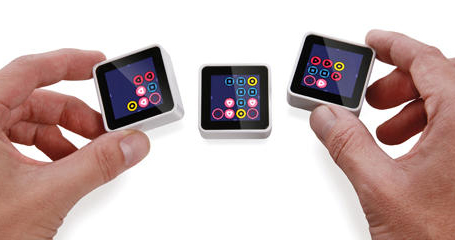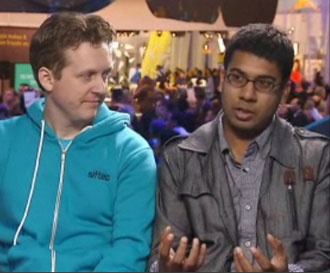Sifteo CEO Jeevan Kalanithi is using cubes containing electromagnetic sensors to bring back the old-fashioned “siftable” board-game interface — with a digital twist.
Kalanithi and Sifteo co-founder David Merrill took a nifty concept developed at the MIT Media Lab — a hotbed of digital media creativity — and turned it into a consumer product that will sell for $149 for a set of three motion-sensitive cubes and the software that turns them into everything from an interactive puzzle to an infinite maze. More cubes can be added for $45 apiece. Sifteo is planning to release its hi-tech blocks later this year after having garnered raves at this year’s Consumer Electronics Show.
While studying at MIT the duo became enamored with the concept of returning games to the social experience they once were when people played games like chess or poker or mahjong, interacting physically with pieces while facing each other around a table instead of focusing on hand-held controllers like today’s typical digital gamer.

Sifteo’s blocks are controlled by a Mac or a PC installed with the “Siftrunner” program and connected to the blocks via a wireless dongle plugged into the computer’s USB port. An app store accessible with the game lets users download game applications most of which currently were created by Sifteo’s in-house developers. One demonstration game displays letters on the blocks’ screens with which users can build words by organizing the blocks and touching them together.
At the moment the most sophisticated game available is Chroma Shuffle created by Josh Lee. Users match up colored pieces displayed on various blocks to clear screens and progress through puzzles. The game takes full advantage of the cubes’ motion-detection capabilities which respond to tilting and turning as well as the actual physical placement relative to the other blocks.
Sifteo’s blocks represent a significant evolution from the blocks developed at MIT Media Lab. For one, they use electromagnetic sensors instead of infrared. Perhaps more importantly from the standpoint of their practicality as a consumer product, they are much less expensive than the $200-apiece MIT blocks.
In hopes of encouraging more third-party game developers Sifteo will release a software development kit later this year.
Before co-founding Sifteo Jeevan Kalanithi co-founded and ran a design and technology consulting business with clients ranging from Fortune 500 companies to non-profits. He has specialized in user interfaces and consumer hardware products. Kalanithi earned a BS in symbolic systems from Stanford and a masters from MIT.


